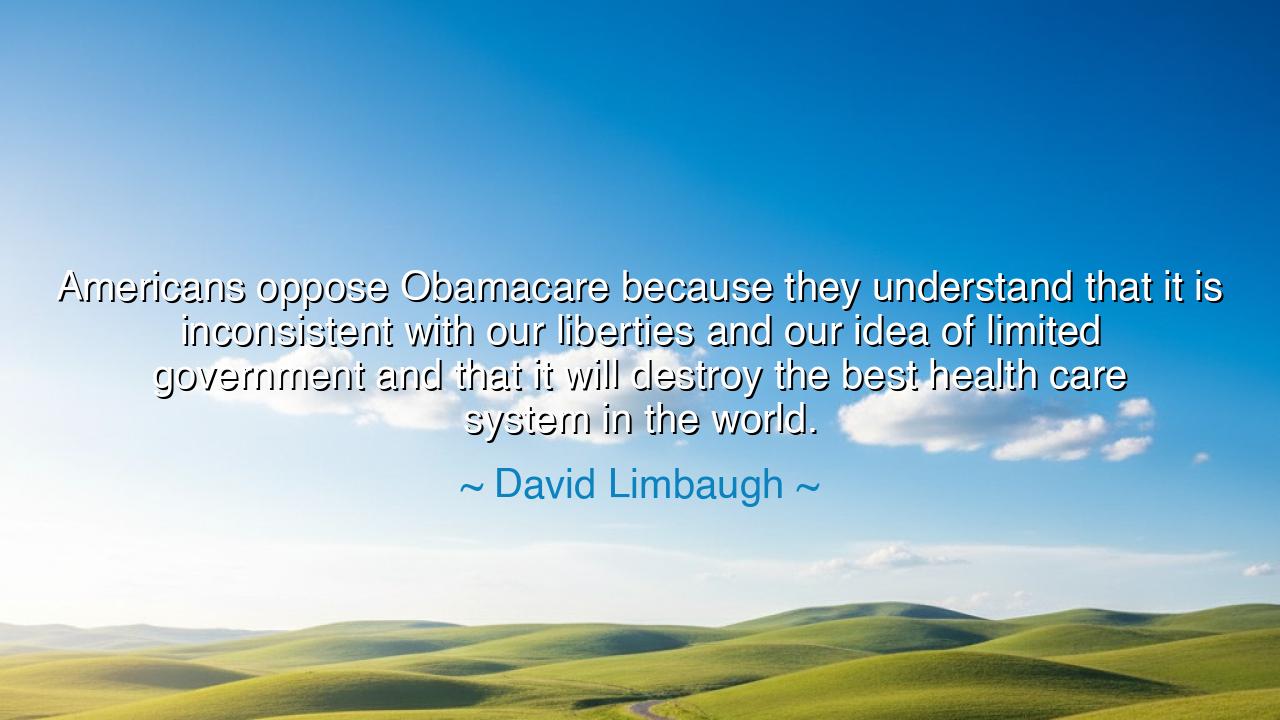
Americans oppose Obamacare because they understand that it is
Americans oppose Obamacare because they understand that it is inconsistent with our liberties and our idea of limited government and that it will destroy the best health care system in the world.






“Americans oppose Obamacare because they understand that it is inconsistent with our liberties and our idea of limited government and that it will destroy the best health care system in the world.” – David Limbaugh
In this fiery declaration, David Limbaugh, a defender of conservative ideals and brother to the famed orator Rush Limbaugh, speaks with the conviction of one who fears the fading of a sacred flame — the flame of liberty. His words are not simply an argument against a law, but a warning about the nature of freedom itself. He calls upon the spirit of the founders, those who birthed a nation upon the principle that the power of government must be bound, that individual choice and personal responsibility are the cornerstones of prosperity. To him, Obamacare, though born of compassion, represents a crossing of boundaries — a moment when government steps not merely into policy, but into the very lives and choices of its citizens.
From the dawn of the American republic, the ideal of limited government has been cherished as both shield and sword. The founders, having fled the tyranny of kings, understood the danger of power unrestrained. They forged a system built upon balance — that the state might protect, but never dominate. In Limbaugh’s eyes, the expansion of federal reach into health care signified not benevolence, but intrusion: a slow erosion of liberty disguised as aid. His cry echoes the ancient truth that freedom, once surrendered for security, is seldom regained.
To understand the depth of this belief, one must remember the American Revolution itself. It was not waged over comfort or safety, but over the principle that a people must rule their own destinies. “No taxation without representation,” they declared — not because of the coin, but because of the control. So too does Limbaugh’s warning follow that same lineage: when the state decides what care you receive, what cost you bear, what choices are allowed, it begins to wield authority over life itself. To him, health care is not merely an economic system — it is a realm of freedom, where the right to choose one’s own path, one’s own healing, must be preserved at all costs.
And yet, the issue is not simple. Those who champion Obamacare see it as the extension of compassion — a means to protect the weak, to heal the poor, to make health a right, not a privilege. In their eyes, it is not tyranny, but mercy. But Limbaugh’s words rise as a counterbalance, reminding future generations that even noble intentions can birth unintended chains. When care becomes command, when the hand that gives is also the hand that controls, the virtue of compassion risks becoming the vice of dependency. His voice is a sentinel’s — wary of a government that grows too large, even when clothed in the language of kindness.
Consider the story of the Roman Republic. Once, Rome’s senators swore that their power existed to serve the people. But as the years passed, the state took upon itself ever more — feeding, employing, and eventually ruling the masses. The citizens, once proud and free, grew comfortable in their reliance, and liberty waned beneath the weight of benevolence turned dominion. Thus fell the Republic, not by invasion, but by surrender — the slow ceding of freedom in exchange for ease. It is this ancient lesson that underlies Limbaugh’s warning: that when government becomes both provider and ruler, it ceases to be servant and becomes master.
Still, his words should not be read as cold rejection of compassion, but as a call for balance — that care and freedom must coexist, that the power to heal must never become the power to command. The challenge of every age is to govern with wisdom: to protect without imprisoning, to uplift without controlling. Limbaugh’s defense of liberty is not the denial of charity, but the affirmation that compassion must be free, not forced; voluntary, not decreed. For in a nation where individuals are trusted to choose, responsibility and dignity grow hand in hand.
Therefore, children of the future, take this teaching to heart: freedom and compassion are twins, not enemies. Beware of the comforts that demand your independence in payment. Question not the worth of kindness, but the form it takes. Serve one another, but guard against any power — be it king, state, or law — that would dictate the terms of your service. True freedom lies not in rejecting care, but in ensuring that care flows from choice, not coercion.
And so, let Limbaugh’s warning endure as a torch: liberty, once lost, is rarely reborn. Whether you stand for or against the policies of your time, do so with vigilance and thought. For every law carries both mercy and risk, and only a people awake to the dangers of power can remain truly free. To protect freedom is not to reject progress, but to remember that no system, however noble, must ever stand above the will and wisdom of a free people.






AAdministratorAdministrator
Welcome, honored guests. Please leave a comment, we will respond soon